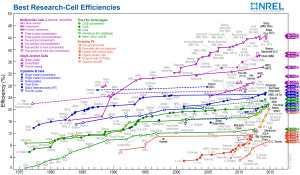
This achievement represents one of the highest photovoltaic research cell efficiencies achieved across all types of solar cells.
Credit: NREL (Click to enlarge)
Improvements in solar power are being developed all around the world, with scientist and researchers continuously attempting to apply electrochemistry and other sciences to solar cells in order to improve efficiency. Recently, the National Renewable Energy Laboratory (NREL) has reported one of the highest photovoltaic cell efficiencies achieved across all types of solar cells.
Researchers at the NREL have demonstrated a 45.7 percent conversion efficiency for a four-junction solar cell at 234 suns concentration.
This from NREL:
Multijunction solar cells harvest sunlight by dividing the solar spectrum into portions that are absorbed by a material with a bandgap tuned to a specific wavelength range. Combining materials with optimal bandgaps is critical for high efficiency. The challenge is to maintain the high quality of the materials while integrating them into a complex cell capable of efficient photoconversion.
The new solar cell has multiple other improvements over previous designs, including: broadband four layer anti-reflection coating, a novel metamorphic tunnel junction interconnect, and unprecedented performance from the GaInP top cell.
“The distinction of this multijunction device is the very high quality of the lattice-mismatched subcells,” said NREL Scientist Ryan France, designer of the solar cell. “Lattice-mismatched materials require the introduction of defects, called dislocations, into the device, which can drastically hinder device performance. NREL has learned to control and confine these dislocations to inactive regions of the device, allowing even highly mismatched material to be used in a multijunction cell.”
The research was supported though the Energy Department’s SunShot Initiative – a program that is working to drive down the cost of solar cell electricity to $0.06 per kilowatt-hour.
ECS has a variety of opportunities for scientist who are pursuing innovative electrochemical research in green energy technology. Currently, we are looking for proposals for our ECS Toyota Young Investigator Fellowship.
If you want assist in addressing critical technology gaps that exist in energy today, make sure to submit your proposals by January 31!
P.S. Don’t forget about our ECS Conference on Electrochemical Energy Conversion & Storage with SOFC-XIV in Glasgow!


